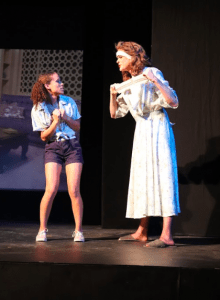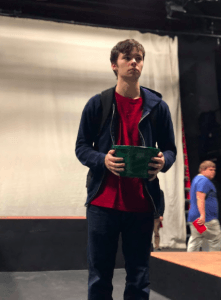
Nov 7, 2019 | News |
Kaitlynn Tarbox Contributing Writer
“Psycho Beach Party,” performed recently by members of the UMF Theater Program, showed audience members themes of mental health awareness, LGBTQ+ relationships, and camp in the 1960s.
Melissa Thompson, assistant professor of visual and performing arts, directed this semester’s production. Thompson describes camp as “explicitly grounded in subcultural queer ways of communcating and creating, humor and critiguing pop culture and politics through a little bit of coded lanquage because this was written in 1986 and set in the 1960s.”

Chicklet and Mrs. Forrest
(Photo courtesy of Stan Spilecki)
Thompson chose this production because “when you’re planning out a theatrical season in the educational theater, you want to make sure that you give the students that are here at UMF a variety of genres to try out.”
This show talked about not only mental health awareness but the LGBTQ+ community as well. It illustrated the evolution and coming out story of two characters and the main protagonist struggled to understand her Dissociative Identity Disorder (DID). DID was previously known as Multiple Personality Disorder, which is classified as two or more personalities that are shown through actions and behaviors.
The cast and crew put in roughly 20 hours a week rehearsing and did so for a total of five weeks as well as one week of tech. The casting process was “gender free,” Thompson said.
The main character Chicklet was originally played by a male in drag, as well as the character of Marvel Ann. However the only character who was played by a cast member in drag was Mrs. Forrest, Chicklet’s mother, who was played by Joseph Campbell, sophomore secondary education major.
While learning his lines were time consuming, Campbell said, “The bulk of prep work every day was sitting down as the makeup people spent about an hour and a half doing my makeup, and then getting into costume, which took about another half hour generally speaking.”
People auditioned for a variety of reasons. Campbell said he auditioned because, “I love comedies, especially campy/weird ones like Psycho Beach Party. I knew that they had drag roles in the show and that seemed like a super exciting thing to try as well.”
Audrey Bradbury, sophomore theater major, played Marvel Ann. “I auditioned for the show primarily because acting is my favorite thing to do on Earth, but also because the play intrigued me,” she said.
Putting the show together took a great deal of hard work according to Thompson, Campbell and Bradbury. What Thompson did not expect was the cast quickly learning to help each other even though they had not known each other long. “My favorite part of directing the show was watching the way the cast worked together,” Thompson said. “There were lots of first-years, lots of transfer students, and they kind of gelled together really quickly. You got to see them bounce ideas off each other.”
Thompson said the main thing she wanted audience members to take away from the show was for “people to have this comedic experience that is not necessarily the kind of comedic experience you have everyday.”
Laughter filled the room during many scenes despite the vulgarity of the humor that it is typical of a camp theme. Some jokes in the script, due to their vulgarity, might not be seen as funny outside of the show, but camp is unique for the way the tone of the characters can change the delivery to get a laugh from the audience. In one scene, Mrs. Forest starts to hit Chicklet but the scene is turned to hilarity in the audience’s eyes as the weapon of choice is a jockstrap, highlighting the strange nature of the play.

Oct 11, 2018 | Feature |
By Aislinn Forbes Contributing Writer
The wood creaked under Brock Bubar’s feet as he entered Alumni Theater through the dark hallway that circles around the seating, having arrived a half an hour before rehearsal starts. Bubar stretches, bending in half or standing on one foot, while he studies his script. “You know, just to go over lines,”

Jonas Maines as main character, Christopher. (Photo by Steffon Gales)
Bubar said, chuckling good naturedly. “There’s a couple lines I always mess up so I have to look at them over and over again.”
Hope Lash, the stage manager, is also there early. Lash is small in stature, but has clear focus and command of a room. Lash has a lot of responsibilities before the actors arrive and after they leave. “My job basically involves knowing everything that happens during a production,” Lash said. As the stage manager, Lash is responsible for communication between the various departments; lights, sound, props, costumes, actors, director.
“Stage managers have such value in the rehearsal and performance process because there is a point where the play moves from the director’s hands to the stage manager’s,” Director Jayne Decker wrote in an email. “Hope worked with me on last year’s production of “Hamlet”, and I’m so glad she is back for our current play.”
Lash’s experience with Hamlet has prepared her well for “A Curious Case of a Dog in the Night-time”. “It’s smaller, it’s a lot smaller.” Lash said, relieved, “The cast is only 10 people, in “Hamlet” there was 22.”
Both Lash and Bubar remarked that the experience developing A Curious Case of a Dog in the Night-time has been rewarding because of the many new faces. “I think about half the cast is incoming students,” Lash’s voice dropped with sincerity, “and they’ve been amazing to work with too, and getting to know them.”
Bubar enthusiastically stated, “That’s one of the best parts about the theater, getting to know everyone you work with.”
The nature of the play and the size of the cast causes most of the actors to play more than one role. Bubar has to portray five separate characters, with two different accents. In order to make costume changes faster between characters, “Everyone has a base of black,” explained Bubar. “And the other stuff is like decoration on top.”
According to Lash, this fits well with the design of the set, “the colors are very muted.”
Decker wrote that she chose the play in order to challenge the actors. “There is great physical work for many of them, including fight choreography and stylized movement.” However, the actor only represent a fraction of the people needed to make the production work.
“One of the great joys in directing a play like Curious Incident is the opportunity to collaborate with scenic and lighting artist, Stan Spilecki,” Decker said, “and sound designer, Michael Diffin because the technical elements establish context for the play.”
Stan Spilecki, in an email interview, described the concept behind the set design. He took the personality of the main character into account when designing the setting, which he calls non-realistic. “Christopher is a mathematics prodigy who needs to order his life,” Spilecki said. “This brings thoughts of order and chaos and thus a version of the Rubik’s Cube.”
Costumes and props are handled by students. Declan Attaway-Murphey and Samantha Wood are responsible for the costume design, the two of them spend hours in the basement of the theater searching through boxes of clothes for things that fit both the show and the actors.
Senior Jessica Leibowitz designs, crafts and organizes the props. “Jess has been working on something all summer,” said Bubar mysteriously. “I haven’t been allowed to see it.”
“A Curious Case of a Dog in the Night-time” opens on Thur., Oct. 18th and will play through Sun., Oct 21st. To purchase tickets students will need to call the UMF box office at (207) 778-7465. Tickets are $5 for students.

